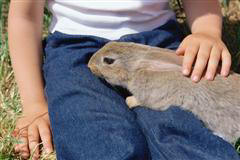|
|

Since your rabbit is not
a predator and is known
as a prey animal they
will seem skittish upon
arrival. Imagine being
taken away from your
friends or family and
introduced to a new home
with new sights, smells,
and sounds. Rabbits are
animals which are sweet
and gentle; over time
your new family member
will learn to trust and
enjoy interactions with
you.
The
following tips will help
your rabbit become a
happy, well-adjusted
member of your family.
As with any new Pet,
patience and persistence
will soon pay off!
1.
Give your rabbit a
chance to settle in for
a day or two. Let them
take in their new
environment without
interference from you or
other family members.
This may be hardest for
families with children
but it is very important
that we give our new Pet
an opportunity to feel
safe and secure in new
surroundings. Your
rabbit needs to get used
to a new cage, new
bedding, food dishes,
sleeping areas, and even
different lighting, so
give them a little time
to feel secure before
you begin positive
interactions. Your Pet
will thank you for it!
2. Move slowly
around your new family
member - avoid fast or
jerky movements. A
startled rabbit will be
a frightened rabbit and
the fewer times your
rabbit is scared will
help ensure your rabbit
quickly learns to trust
you.
3. Your rabbit will
flee when you initially
move your hand toward
them. Gently scoop your
rabbit up under the
stomach while supporting
the back legs. Keep in
mind, rabbits have very
fragile bones
(especially the
backbone), and are able
to break them struggling
to free themselves. In
addition, rabbit are
known to be kickers,
don't be startled, this
is a natural defense
mechanism.
 4. Keep your rabbit close to your body or
place securely on your
lap. Rabbits feel most
comfortable with their
feet on the ground, so
placing on your lap is
an excellent way to
begin interactions. 4. Keep your rabbit close to your body or
place securely on your
lap. Rabbits feel most
comfortable with their
feet on the ground, so
placing on your lap is
an excellent way to
begin interactions.
5. A rabbit wrapped
in a towel can help them
feel secure and will
help you avoid being
scratched. Wrapping in a
towel is often called a
"Bunny Burrito".
6. Handling your
rabbit should be kept to
short, frequent
intervals. The goal is
to make each outing a
positive experience so
only keep your rabbit
out long enough for them
to enjoy their time with
you before putting them
back. 5-10 minutes is
plenty of time to be out
with you and doing this
a few times a day is
much less stressful than
a 60 minute session once
per day.
7. Offer your new
Pet healthy treats.
There are many
commercial treats
available from all major
Pet stores and you should offer fresh
fruits or vegetables
daily. Offering these
"treats" to your Pet
during interaction will
help create a strong
bond and trust between
you and your rabbit.
Always remember the goal
during any interaction
is simply to end on a
happy note. Don't wait
until your new Pet is
ready to go back; end
your time together
before this happens.
Positive interactions,
patience, and
persistence will help
you and your new Pet
become the best of
friends! treats
available from all major
Pet stores and you should offer fresh
fruits or vegetables
daily. Offering these
"treats" to your Pet
during interaction will
help create a strong
bond and trust between
you and your rabbit.
Always remember the goal
during any interaction
is simply to end on a
happy note. Don't wait
until your new Pet is
ready to go back; end
your time together
before this happens.
Positive interactions,
patience, and
persistence will help
you and your new Pet
become the best of
friends!
|